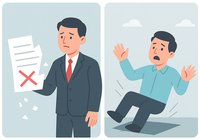| Phrasal verb | Main meaning |
|---|---|
fall back [fɔːl bæk] | to retreat |
Other meanings
- to rely on something as a backup (fall back on)
- to revert to a previous state or habit (fall back into)
- to move backward in time (of clocks: to fall back one hour for DST)
- to decrease/return to an earlier level
Example Sentences Using the Phrasal Verb "fall back"
- The army fell back after heavy shelling.
- When their first plan failed, they fell back on their savings.
- As autumn came, the clocks fell back an hour.
- After the argument, she fell back into old habits.
- Support for the product fell back to pre-launch levels.
Features of Using "fall back"
The verb fall back is most often used intransitively to describe a physical or figurative retreat. When combined with the preposition on (fall back on) it means to rely on something as a reserve and requires the object after on.
The construction is not separable, so you cannot place an object between fall and back. Context decides the meaning: military/movement, reliance (backup), reversion to old habits, clock/time change, or numerical decrease. In past tense the verb form is fell (e.g., they fell back).
Other phrasal verbs with the verb fall
fall apart
to break into pieces; disintegrate
fall off
to drop down from something
fall over
to lose balance and collapse to the ground
fall down
to collapse or drop to the ground
fall out
to stop being friends or in agreement
fall in
to line up in formation
fall away
to gradually disappear or become less
fall behind
to move slower than others or fail to keep up
fall on
to attack or begin to attack someone or something
fall for
to be tricked or deceived
fall into
to begin to be in a particular state or condition
fall under
to be classified or placed within a particular category, jurisdiction, rule, or authority
fall to
to become the responsibility or duty of someone
fall upon
to attack suddenly and violently
fall through
to fail to happen or be completed
🔗 Learn more about the irregular verb fall, including its forms and usage.
















